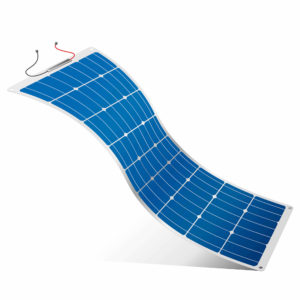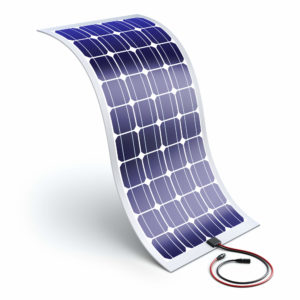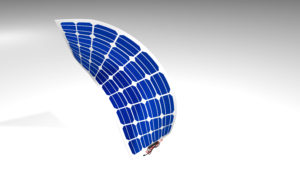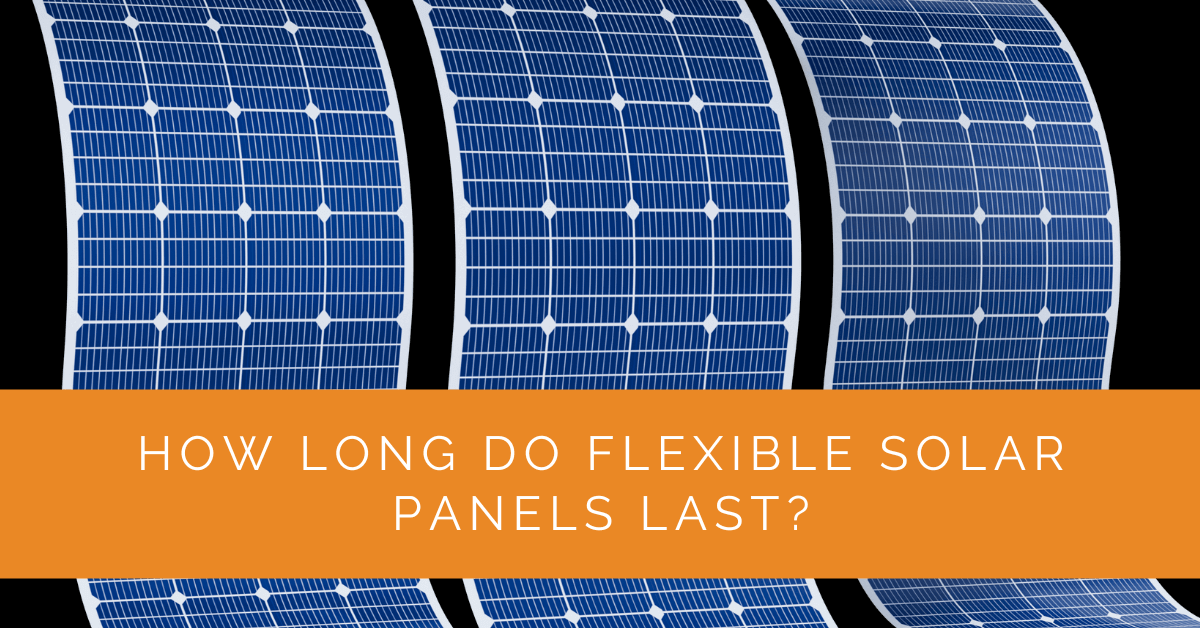When considering portable solar solutions, it’s crucial to understand the lifespan of flexible solar panels. In this article, we will explore the durability of flexible solar panels and their longevity. By the end, you’ll understand how long these panels can last and how to make the most of their lifespan.
Contents
- 1 Key Takeaways
- 2 The Basics of Flexible Solar Panels
- 3 Advantages of Flexible Solar Panels
- 4 Factors Affecting the Lifespan of Flexible Solar Panels
- 5 Average Lifespan of Flexible Solar Panels
- 6 Extending the Lifespan of Flexible Solar Panels
- 7 Comparing Flexible Solar Panels to Traditional Solar Panels
- 8 Pros and Cons of Flexible Solar Panels
- 9 Investing in Quality Flexible Solar Panels
- 10 Applications and Uses of Flexible Solar Panels
- 11 Case Study: Enhancing the Lifespan of Flexible Solar Panels in Portable Applications
- 12 Expert Insights From Our Solar Panel Installers About the Lifespan of Flexible Solar Panels
- 13 Experience Solar Excellence with Us!
- 14 Conclusion
Key Takeaways
- Flexible solar panels typically have an average lifespan of 10 to 25 years, depending on factors such as quality of materials, environmental conditions, maintenance practices, and installation quality.
- Proper care, regular cleaning, and avoiding excessive bending or stress can help extend the lifespan of flexible solar panels.
- When comparing flexible solar panels to traditional rigid panels, consider their advantages, such as portability, adaptability to curved surfaces, lightweight design, and aesthetic appeal. However, they may have slightly lower efficiency and shorter lifespans than rigid panels.
The Basics of Flexible Solar Panels
Flexible solar panels, also known as thin-film solar panels, offer a lightweight and versatile alternative to traditional rigid panels. These panels use thin layers of photovoltaic (PV) cells, typically deposited onto flexible materials such as plastic or metal. This construction makes the panels more adaptable and conform to curved surfaces, opening up a wide range of installation possibilities.
Unlike their rigid counterparts, flexible solar panels are significantly lighter and thinner. This makes them easier to handle, transport, and install in various settings. The flexibility of these panels makes them ideal for applications such as camping, boating, RVs, and portable charging solutions.
Advantages of Flexible Solar Panels
Flexible solar panels come with several advantages that make them a preferred choice for specific applications:
- Lightweight and Portable: The lightweight design of flexible solar panels makes them easy to carry and transport. They are an excellent option for outdoor activities or situations where mobility is a priority, such as camping trips or hiking expeditions.
- Versatile and Adaptable: These solar panels can conform to curved surfaces thanks to their flexibility, allowing for creative and customized installations. They can be mounted on irregularly shaped surfaces like boat decks, RV roofs, or backpacks, maximizing available space.
- Aesthetically Appealing: Flexible solar panels have a low-profile design, which blends seamlessly into various environments. Their sleek appearance and the absence of bulky frames or supports contribute to a clean and aesthetically pleasing installation.
- Durability: Flexible solar panels are generally more resistant to impact and vibrations than rigid panels. Their construction using flexible materials reduces the risk of cracking or damage in harsh environments, making them suitable for rugged outdoor use.
- Easy Installation: These panels’ lightweight and flexible nature simplifies the installation process. They can be mounted using adhesives or secured with grommets, eliminating the need for complex racking systems. This ease of installation also reduces the time and effort required for setup.

Factors Affecting the Lifespan of Flexible Solar Panels
Several factors can influence the lifespan of flexible solar panels, and understanding these factors is crucial for maximizing their longevity. Here are some key considerations:
- Quality of Materials: The quality of materials used in manufacturing flexible solar panels plays a significant role in their durability. High-quality materials are more resistant to environmental stressors and less likely to degrade.
- Environmental Conditions: The environment in which the panels are installed greatly impacts their lifespan. Factors such as temperature extremes, humidity, and exposure to UV radiation can affect the performance and longevity of the panels. Extreme heat or cold can cause expansion or contraction, leading to potential damage or reduced efficiency.
- Maintenance and Care: Proper maintenance practices can significantly extend the lifespan of flexible solar panels. Regular cleaning to remove dirt, dust, or debris is essential for optimal performance. It’s important to avoid using abrasive materials or harsh chemicals that can scratch or damage the surface. Additionally, preventing excessive bending or stress on the panels can help avoid microcracks or internal damage.
- Installation Quality: The installation process plays a vital role in the lifespan of flexible solar panels. Proper mounting techniques, ensuring secure connections, and using appropriate mounting hardware are crucial for the long-term stability and performance of the panels. Improper installation can increase the panels’ stress, which may shorten their lifespan.
Average Lifespan of Flexible Solar Panels
The average lifespan of flexible solar panels typically ranges from 10 to 25 years, depending on various factors. Manufacturers often provide warranty periods that indicate the expected minimum lifespan of their panels. However, it’s important to note that the actual lifespan can vary based on factors such as the quality of the panels, environmental conditions, maintenance practices, and installation quality.
It’s important to consider the manufacturer’s reputation and the warranty coverage provided when assessing the expected lifespan of flexible solar panels. Reputable manufacturers often conduct rigorous testing and use high-quality materials to ensure the durability and longevity of their panels. Additionally, longer warranty periods indicate the manufacturer’s confidence in their product’s lifespan.
While the average lifespan of flexible solar panels falls within the 10 to 25-year range, it’s worth noting that some panels may exceed this timeframe with proper care and maintenance. On the other hand, certain environmental conditions or improper handling can potentially shorten their lifespan. Therefore, taking the necessary steps to maximize the longevity of flexible solar panels is essential.

Extending the Lifespan of Flexible Solar Panels
To extend the lifespan of flexible solar panels and optimize their performance, following best practices for maintenance and care is important. Here are some key strategies to consider:
- Regular Cleaning: Regularly clean the surface of the panels to remove dirt, dust, pollen, or other debris that can obstruct sunlight absorption. Use a soft cloth or sponge with a mild detergent and water solution to gently wipe the surface. Avoid abrasive materials or harsh chemicals that can cause scratches or damage.
- Avoid Excessive Bending or Stress: While flexible solar panels are designed to be more durable and resilient, avoiding excessive bending or stress is still important. Folding the panels beyond their recommended bend radius can damage the internal components and reduce efficiency. Handle the panels carefully during installation and avoid any unnecessary strain on the panels.
- Protection from Extreme Weather: Protecting the panels from extreme weather conditions can help prolong their lifespan. Regularly remove accumulated snow in areas prone to heavy snowfall to prevent excess weight and potential damage. Likewise, in regions with hailstorms, consider installing protective covers or shelters to minimize the impact of hailstones.
- Inspect for Damage: Periodically inspect the panels for any signs of damage, such as cracks, delamination, or loose connections. If any issues are detected, address them promptly to prevent further deterioration. It’s recommended to have a professional assess and repair any significant damage to ensure the panels’ optimal performance.
- Maintain Proper Ventilation: Proper ventilation around the panels is crucial for dissipating heat and preventing overheating. Ensure adequate airflow and avoid installing the panels in areas where heat can become trapped, such as enclosed spaces or tightly sealed mounting structures.
By following these practices, you can significantly increase the lifespan of your flexible solar panels and maintain their efficiency over time.
Comparing Flexible Solar Panels to Traditional Solar Panels
To make an informed decision, it’s essential to understand the differences between flexible and traditional solar panels. Traditional solar panels, known as crystalline panels, are made using rigid silicon wafers. They offer higher efficiency and longer lifespans compared to flexible panels. However, rigid panels are bulkier, heavier, and less adaptable to curved surfaces. Flexible panels, on the other hand, excel in portability and versatility but sacrifice some efficiency and longevity compared to rigid panels.
Pros and Cons of Flexible Solar Panels
Let’s explore the pros and cons of flexible solar panels in more detail:
Pros of Flexible Solar Panels
- Lightweight and portable, ideal for camping, boating, and RV applications.
- Flexible design allows for installation on curved surfaces.
- Aesthetically appealing with a low-profile appearance.
- Versatile and adaptable, expanding installation possibilities.
- Easy to handle and transport due to their lightweight nature.
Cons of Flexible Solar Panels
- Lower efficiency compared to traditional rigid panels.
- Shorter lifespan compared to rigid panels.
- Vulnerable to physical damage if mishandled or excessively bent.
- Less suitable for large-scale solar installations due to lower efficiency.

Investing in Quality Flexible Solar Panels
Investing in high-quality flexible solar panels is crucial to ensure longevity and optimal performance. When considering purchasing flexible solar panels, here are some key factors to keep in mind:
- Research Reputable Manufacturers and Suppliers: Look for manufacturers and suppliers with a proven track record of producing reliable, durable, flexible solar panels. Read customer reviews, check for certifications, and inquire about warranty terms.
- Certifications and Standards: Verify if the flexible solar panels meet industry standards and certifications. Look for certifications such as UL (Underwriters Laboratories) and IEC (International Electrotechnical Commission) to ensure safety and performance standards compliance.
- Panel Efficiency: While flexible solar panels may have slightly lower efficiency than traditional rigid panels, it’s still important to consider the efficiency ratings. Higher efficiency panels can generate more power, even in low-light conditions, potentially offset the shorter lifespan.
- Warranty Coverage: Pay attention to the warranty coverage offered by manufacturers. A longer warranty period indicates the manufacturer’s confidence in the product’s lifespan. Ensure the warranty covers defects, power output, and potential degradation over time.
- Cost vs. Value: While cost is a significant consideration, it’s important not to compromise quality for a lower price. Focus on the value of flexible solar panels in terms of durability, efficiency, and warranty coverage.
Applications and Uses of Flexible Solar Panels
Flexible solar panels find a wide range of applications due to their unique characteristics. Here are some popular use cases:
- Camping and RVs: Flexible solar panels are lightweight, portable, and ideal for camping trips and RV adventures. They can easily be mounted on tents, RV roofs, or backpacks to harness solar energy on the go.
- Marine Applications: Boats and yachts can benefit from flexible solar panels, which can be mounted on curved surfaces such as decks or bimini tops. They provide a reliable power source for lighting, navigation systems, and charging batteries.
- Off-Grid Power Solutions: Flexible solar panels are an excellent choice for off-grid power setups, such as remote cabins, tiny homes, or emergency backup systems. They can be installed on roofs, awnings, or even rolled out during outdoor activities.
- Portable Charging: With the increasing popularity of portable electronic devices, flexible solar panels offer a convenient way to charge smartphones, tablets, cameras, and other gadgets while moving.
- Educational and DIY Projects: Flexible solar panels are also used in educational settings to teach students about renewable energy. They are great for DIY enthusiasts who want to experiment with solar power and build small-scale projects.
Case Study: Enhancing the Lifespan of Flexible Solar Panels in Portable Applications
Background
Solar Panels Network USA is dedicated to providing innovative and durable solar solutions for a variety of applications. Recognizing the growing demand for portable solar energy, we explored ways to extend the lifespan of flexible solar panels used in mobile and off-grid setups.
Project Overview
The project aimed to evaluate and implement best practices for maintaining and maximizing the lifespan of flexible solar panels in various portable applications. We focused on outdoor activities such as camping, boating, and RV travel, where flexible panels are frequently used.
Implementation
- Site and Application Assessment:
- Identified key usage scenarios for flexible solar panels, including camping sites, boat decks, and RV roofs.
- Conducted a detailed analysis of environmental conditions and typical wear and tear associated with these applications.
- Installation and Maintenance Protocols:
- Developed comprehensive installation guidelines to ensure secure mounting and minimize stress on the panels.
- Implemented a routine maintenance schedule, emphasizing regular cleaning, inspection for damage, and protection from extreme weather conditions.
- Quality Materials and Testing:
- Selected high-quality flexible solar panels from reputable manufacturers with rigorous testing and certification standards.
- Conducted field tests to evaluate the performance and durability of the panels under various conditions.
Results
The implementation of these best practices resulted in a noticeable improvement in the longevity and performance of flexible solar panels. Key findings include:
- Extended Lifespan: Proper installation and regular maintenance extended the average lifespan of the panels, with many exceeding 20 years of effective use.
- Enhanced Durability: Panels subjected to routine cleaning and protected from extreme weather showed less wear and tear, maintaining higher efficiency over time.
- Improved User Satisfaction: Users reported increased satisfaction due to the reliability and consistent performance of the panels in diverse outdoor settings.
Summary
Our project successfully demonstrated that by adopting best practices for installation, maintenance, and the use of high-quality materials, the lifespan of flexible solar panels can be significantly enhanced. These findings are particularly relevant for portable applications where durability and reliability are paramount. At Solar Panels Network USA, we continue to innovate and provide sustainable solar solutions tailored to the needs of our diverse clientele.
Expert Insights From Our Solar Panel Installers About the Lifespan of Flexible Solar Panels
Flexible solar panels offer a great balance between portability and efficiency. With proper care, regular cleaning, and avoiding excessive stress on the panels, their lifespan can be extended significantly, often reaching up to 25 years.
Senior Solar Engineer
Environmental conditions play a crucial role in the longevity of flexible solar panels. Ensuring they are protected from extreme weather and regularly inspected for damage can help maintain their performance over the years.
Lead Solar Technician
The key to maximizing the lifespan of flexible solar panels is proper installation and maintenance. Using high-quality materials and following best practices for mounting and care can make a significant difference.
Chief Installation Engineer
Experience Solar Excellence with Us!
Trust in Solar Panels Network USA, where our seasoned experts deliver top-quality solar solutions for homes and businesses nationwide. With a legacy of countless successful installations and a commitment to sustainable energy, we’re your reliable partner in the solar journey. Ready for a brighter, eco-friendly future? Call us now at (855) 427-0058 and harness the power of the sun!
Conclusion
Flexible solar panels provide a lightweight, portable, and versatile solution for harnessing solar energy in various applications. While they may have a shorter lifespan and lower efficiency than traditional rigid panels, their unique advantages make them popular for many users. By understanding the factors that influence the lifespan of flexible solar panels and implementing proper care and maintenance practices, you can maximize their longevity and enjoy the benefits of clean and renewable energy for years.
When purchasing flexible solar panels, research reputable manufacturers, consider certifications and warranty coverage, and weigh the pros and cons based on your specific needs. With the right choice and proper utilization, flexible solar panels can be an excellent investment in sustainable energy solutions.
Now that you have a comprehensive understanding of the lifespan and applications of flexible solar panels, you can confidently make informed decisions when incorporating them into your solar power setup or portable energy solutions.
About the Author
Solar Panels Network USA stands at the forefront of solar energy solutions, driven by a team of seasoned solar engineers and energy consultants. With over decades of experience in delivering high-quality solar installations and maintenance, we are committed to promoting sustainable energy through customer-centric, tailored solutions. Our articles reflect this commitment, crafted collaboratively by experts to provide accurate, up-to-date insights into solar technology, ensuring our readers are well-informed and empowered in their solar energy decisions.

